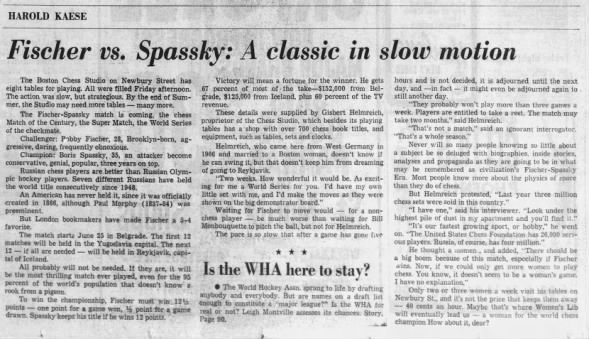The Boston Globe Boston, Massachusetts Sunday, February 20, 1972 - Page 81
Fischer vs. Spassky: A Classic in Slow Motion by Harold Kaese
The Boston Chess Studio on Newbury Street has eight tables for playing. All were filled Friday afternoon. The action was slow, but strategious. By the end of Summer, the Studio may need more tables—many more.
The Fischer-Spassky match is coming, the chess Match of the Century, the Super Match, the World Series of the checkmate.
Challenger: Bobby Fischer, 28, Brooklyn-bred, aggressive, daring, frequently accused of being offensive (by offensive people).
Champion: Boris Spassky, 35, an attack become conservative, genial, popular, three years on top.
Russian chess players are better than Russian Olympic hockey players. Seven different Russians have held the world title consecutively since 1948.
An American has never held it, since it was officially created in 1866, although Paul Morphy (1837-84) was preeminent.
But London bookmakers have made Fischer a 5-4 favorite.
The match starts June 25 in Belgrade. The first 12 matches will be held in the Yugoslavia capital. The next 12 — if all are needed — will be held in Reykjavik, capital of Iceland.
All probably will not be needed. If they are, it will be the most thrilling match ever played, even for the 95 percent of the world's population that doesn't know a rook from a pigeon.
To win the championship, Fischer must win 12½ points — on point for a game won, ½ point for a game drawn. Spassky keeps his title if he wins 12 points.
Victory will mean a fortune for the winner. He gets 67 percent of most of the take—$152,000 from Belgrade, $125,000 from Iceland, plus 60 percent of the TV revenue.
These details were supplied by Gisbert Helmreich, proprietor of the Chess Studio, which besides its playing tables has a shop with over 700 chess book titles, and equipment, such as tables, sets and clocks.
Helmreich, who came here from West Germany in 1966 and married to a Boston woman, doesn't know if he can swing it, but that doesn't keep him from dreaming of going to Reykjavik.
“Two weeks. How wonderful it would be. As exciting for me a World Series for you. I'd have my own little set with me, and I'd make the moves as they were shown on the big demonstration board.”
Waiting for Fischer to move would — for a non-chess player — be much worse than waiting for Bill Monbouquette to pitch the ball, but not for Helmreich.
The pace is so slow that after a game has gone five hours and is not decided, it is adjourned until the next day, and — in fact — it might even be adjourned again to still another day.
“They probably won't play more than three games a week. Players are entitled to take a rest. The match may take two months,” said Helmreich.
“That's not a match,” said an ignorant interrogator. “That's a whole season.”
Never will so many people knowing so little about a subject be so deluged with biographies, inside stories, analyses and propaganda as they are going to be in what may be remembered as civilization's Fischer-Spassky Era. Most people know more about the physics of space than they do of chess.
But Helmreich protested, “Last year three million chess sets were sold in this country.”
“I have one,” said his interviewer. “Look under the highest pile of dust in my apartment and you'll find it.”
“It's our fastest growing sport, or hobby,” he went on. “The United States Chess Foundation has 26,000 serious players. Russia, of course, has four million.”
He thought a moment and added, “There should be a big boom because of this match, especially if Fischer wins. Now, if we could only get more women to play chess. You know, it doesn't seem to be a woman's game. I have no explanation.”
Only two or three women a week visit his tables on Newbury St., and its not the price that keeps them away — 40 cents an hour. Maybe that's where Women's Lib will eventually lead us — a woman for the world chess champion. How about it, dear?
 Fischer vs. Spassky: A Classic in Slow Motion Sun, Feb 20, 1972 – 81 · The Boston Globe (Boston, Massachusetts) · Newspapers.com
Fischer vs. Spassky: A Classic in Slow Motion Sun, Feb 20, 1972 – 81 · The Boston Globe (Boston, Massachusetts) · Newspapers.com























